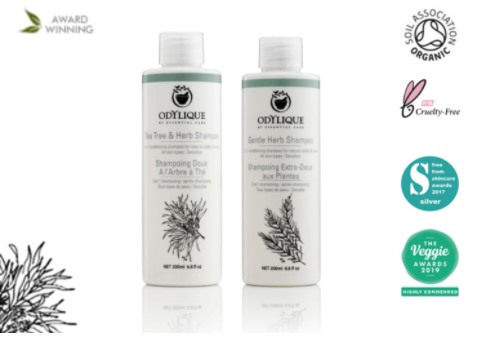Sensitive Scalp
Two recent studies* have found that on average 40% of adults suffer from an sensitive or itchy scalp.
Interestingly, it isn’t only those with sensitive skin, dermatitis, psoriasis or eczema who experience scalp sensitivity. The itchiness, tingling or pain associated with a sensitive scalp can be a direct result of pollution, heat, stress, chemical treatments and shampoos.
Our skin’s main defence against external injury is a healthy and intact oil and moisture barrier, but this can be undermined and damaged. Exposure to the elements and a potentially wide array of irritating chemicals make the scalp - and hair - particularly vulnerable to damage and sensitisation.
With this in mind, here is our 5-point guide to a healthy scalp - and beautiful hair!
i) Use a gentle, pH-balanced shampoo**
Repeated washing with harsh shampoo strips the oils from our scalp and damages the hair cuticle in the same way that strong cleansers can leave our face and hands dry and sore.
So it makes sense to avoid shampoos based on known potential irritants like sulphates and synthetic fragrances as these may actually increase the flaking and itching of a sensitive scalp. Opt for a shampoo based on gentle plant origin cleansers, natural herbs and conditioning agents that is also acid-balanced to the scalp and hair (around pH 5.5).
If your scalp is irritated, try to shampoo hair no more than twice weekly, rinse well and possibly finish with an acid rinse (see point ii).
Odylique organic natural shampoos are ideal for a sensitive scalp:
ii) Neutralise hard water
Lime-scale makes water ‘hard’ and alkaline which is not the scalp’s best friend as it dulls the hair and disturbs the scalp’s natural acid mantle allowing chemicals and bacteria easier access.
If you live in a hard water area, applying either a proprietary acid rinse or adding a few drops of cider vinegar or lemon juice to half a litre of water as a final rinse will promote an itch-free scalp and shiny hair.
iii) Rinse on a non-wash day
As well as using a gentler shampoo, try washing a bit less often. A thorough rinse with clear water in the shower followed by an acid rinse (see above) if necessary can gently cleanse, remove sweat and refresh scalp and hair between shampoos. (Oily hair and a dry scalp is a common consequence of ‘too-much too-often’ strong shampoo.)
You can also try co-washing ('washing' with a silicone-free conditioner) which can work very well on some hair types, particularly curly. Odylique all-natural and silicone-free conditioners are ideal for this. And with their prebiotic and soothing herbal ingredients, they can help de-sensitise your scalp.
iv) Go easy on styling products and hair colourants
It’s not the sexiest solution, but using fewer styling products helps for two reasons. They generally don’t benefit hair or scalp health as such and being high in drying solvents and plasticisers, require a strong ‘clarifying’ shampoo to remove their build-up.
Choose the kindest colourant you can, ideally a natural hair dye based on plants like henna and walnut and treat your hair and scalp to a weekly overnight nourishing mask.
v) Protect hair and scalp from heat and sun
Rather obvious, but wearing a hat gives good protection from strong sunlight, wind and pollution. Hair care products containing natural anti-oxidant herbs like horsetail, nettle, chamomile and aloe give protection from UV damage and hair colour fading.
Artificial heat can be also be pretty drying, so allow your hair to dry naturally where practical or have your hairdryer on a low setting.
*44% and 36% of the respective test populations.
**Odylique Gentle Herb Shampoo received the award for Best Shampoo for Sensitive Scalps in the 2015-2016 Observatoire des Cosmetiques awards.
References:
- Br J Dermatol. 2008 Jan;158(1):130-3. Epub 2007 Nov 6. Sensitive skin is not limited to the face. Saint-Martory C1, Roguedas-Contios AM, Sibaud V, Degouy A, Schmitt AM, Misery L.
- Contact Dermatitis. 2008 Apr;58(4):234-8. doi: 10.1111/j.1600-0536.2007.01288.x. Sensitive scalp: does this condition exist? An epidemiological study. Misery L1, Sibaud V, Ambronati M, Macy G, Boussetta S, Taieb C.
- Int J Trichology. 2012 Apr-Jun; 4(2): 102–104. Sensitive Scalp Kiran Godse and Vijay Zawar1
- Clin Exp Dermatol. 2009 Dec;34(8):e521-30. doi: 10.1111/j.1365-2230.2009.03487.x. Epub 2009 Aug 28. How do perceptions of sensitive skin differ at different anatomical sites? An epidemiological study. Farage MA

